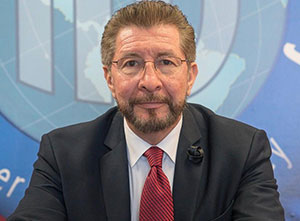The two Americas of the twenty-first century are; the democratic one and the dictatorial other

By: Carlos Sánchez Berzaín - 09/12/2023
Share:
In this 21st century, there are two Americas and the difference between them is; the existence or inexistence of freedom and democracy, the way peoples live and are governed with regard or disregard of respect for human rights, and the nature of the government as the peoples civil servant or as the owner, proprietor, and concentrator of all power that turn the people into its serfs. The main axis of confrontation in the Americas is democracy and dictatorship, freedom, or organized crime.
The world in this 21st century is capitalist, globalized and is experiencing the communications and artificial intelligence technological revolution. In today's world there is no debate as to "what" the world is, the dispute resides in "how" this capitalist and globalized world is organized and governed, a question that presents two options; the option of governing based on freedom and respect for human rights, or the option to govern through the authoritarian concentration of power violating freedoms and fundamental rights of the people.
The two Americas today, are characterized by the principal division that exists regarding freedom and human rights. Democracy with governments in which the peoples are the sovereign and the governments have a mandate and an obligation to govern temporarily within the framework of the law and be held accountable; or dictatorship with governments who indefinitely concentrate all power through State-terrorism and organized crime with impunity.
Democracy in the Americas is expressly defined by the Inter-American Democratic Charter signed in Lima, Peru on September 11, 2001, a constitutive treaty that in its first article states: “The peoples of America have the right to democracy and their governments the obligation to promote and defend it. Democracy is essential for the social, political, and economic development of the peoples of the Americas.” The third article of this Charter identifies the essential elements of democracy whose inexistence identifies dictatorships and those governments that violate and destroy them.
Dictatorship is the “political regime that, by force or violence, concentrates all power in a person or in a group or organization and represses human rights and individual freedoms.” Dictatorships hold power through “State-terrorism,” which is defined as “the use of illegitimate methods and crimes by a regime to produce fear or terror in the civilian population and in this way achieve its objectives or encourage behaviors that would otherwise not occur on their own,” they do so indefinitely and with impunity. They are made evident because they have political prisoners and exiles, use the judicial as an instrument of repression, torture and attacks on life and private property. Dictatorships are statist, centralist and repressive.
At the end of the past century, the region was undoubtedly democratic. In December 1994, the First Summit of the Americas was held in Miami that established a regional policy that reflected the policy of the 34 attending countries, all democratic, establishing: “a covenant for development and prosperity based on the conservation and strengthening of the community of democracies of the Americas.” Democracy, sustainable development, the fight against drug trafficking, the eradication of poverty and the development of a common market were the main issues among “59 mandates based on 23 themes.” The initiative for this notable agreement started with the 41st president of the U.S. George H. Bush’s administration and was developed by President Bill Clinton in a way that expressed a bipartisan state foreign policy. The only country absent was the only existing dictatorship, Cuba.
In the 21st century, the Americas endure the expansion of Cuba’s dictatorship that has imposed its system in Venezuela, Bolivia, and Nicaragua, and -beyond that- controls the governments of democratic countries through the molding of, and support to, candidates who when they ascend to power subject the States they represent to the service of the dictatorships. These are the Para-Dictatorial governments of Argentina (one more week), Mexico, Chile, Colombia, and Brazil. All of these comprise 21st Century Socialism -or Castrochavism- under the command of Cuba.
The Americas suffer migratory crises, drug trafficking, citizen insecurity, destabilization of governments and democratic institutions, manipulation of educational systems, attacks on freedom and human rights, assassinations and crimes, assassinations of reputations, and a long chain of aggressions that produce social and economic crises, all of these directed by Cuba. This situation has one and only conclusion that urges to be understood; “Americas’ freedom and security start with the liberation of the Cuban peoples.”
There is no way for freedom and democracy to prevail if their leaders do not clearly identify the enemy and take initiatives to end the aggression and neutralize the aggressor. To address only the consequences and not the cause only aggravates further the situation and is a sign of bad governments.
*Attorney & Political Scientist. Director of the Interamerican Institute for Democracy
Translated from Spanish by Edgar L. Terrazas
«The opinions published herein are the sole responsibility of its author».